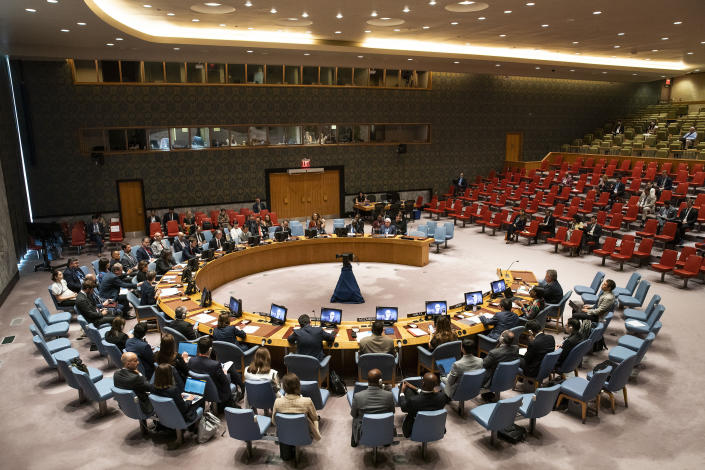Russia Faces Pressure at UN Security Council to Avert Global Food Crisis and Revive Ukrainian Grain Shipments
In a meeting held at the United Nations Security Council on Friday, Russia faced mounting pressure from its ally China, as well as developing countries and Western nations, to prevent a global food crisis and quickly resume Ukrainian grain shipments. Moscow was criticized by the UN and council members for attacking Ukrainian ports and destroying port infrastructure, which is a violation of international humanitarian law that prohibits attacks on civilian infrastructure.
The UN warned that Russia’s declaration of wide areas in the Black Sea as dangerous for shipping could have “catastrophic consequences” if a military incident were to occur. Russia suspended the Black Sea Grain Initiative, citing the UN’s failure to overcome obstacles in shipping its food and fertilizer to global markets, which is the other half of the Ukraine grain deal. The Kremlin stated that it would consider resuming Ukrainian shipments if progress is made in overcoming these obstacles, including in banking arrangements.
China’s deputy UN ambassador, Geng Shuang, highlighted UN Secretary-General Antonio Guterres’ commitment to ensuring that both Ukrainian grain and Russian food and fertilizer reach world markets. He expressed hope that Russia and the UN would work together to resume exports from both countries “at an early date” to maintain international food security and alleviate the food crisis in developing countries.
US Ambassador Linda Thomas-Greenfield accused Russia of using the Black Sea as a tool for “blackmail” and playing political games. She called on the Security Council and all 193 UN member nations to unite and urge Russia to resume negotiations in good faith. Several developing countries also warned about the impact of the cutoff in Ukrainian grain shipments, which has already led to a rise in wheat prices.
Gabon’s UN Ambassador Michel Biang emphasized that the grain deal had prevented a spike in grain prices and reduced the risk of food insecurity in drought-affected regions like the Horn of Africa. He urged talks to break the current deadlock and avoid a humanitarian crisis. Mozambique’s UN Ambassador Pedro Afonso stated that Russia’s actions would amplify global socio-economic stresses in a world already grappling with conflict, climate change, and a loss of confidence in multilateral solutions.
Russia’s deputy UN ambassador, Dmitry Polyansky, stated that Russia would consider rejoining the deal if seven principles from the Russia-UN memorandum were implemented. These principles include the lifting of Western sanctions on Russian grain and fertilizer exports, the removal of obstacles to Russian banks servicing exports, and the resolution of issues related to chartering vessels and fertilizer.
Under the deal, Ukraine was allowed to ship grain from three Black Sea ports. However, following Russia’s withdrawal, it announced that it would treat ships traveling to Russian Black Sea ports as military targets. The United States informed the council that Russia had laid additional sea mines near Ukrainian ports and warned that Russia’s military might attack civilian shipping in the Black Sea and blame Ukraine for the attacks.
U.N. political chief Rosemary DiCarlo strongly condemned Russian attacks on Ukraine’s Black Sea ports and urged Moscow to stop them immediately. She emphasized that threats to target civilian vessels and the presence of sea mines endanger civilian navigation. The UN called on all parties to exercise restraint, abide by international humanitarian law, and refrain from attacking civilian infrastructure to prevent a larger-scale humanitarian crisis.
U.N. humanitarian chief Martin Griffiths informed the council that a record 362 million people in 69 countries require assistance, necessitating an unprecedented $55 billion. The cutoff of Ukrainian grain shipments has already resulted in civilian casualties, damage to port infrastructure, and a 9% spike in wheat prices, the largest since Russia’s invasion of Ukraine in February 2022. Griffiths described the situation as a “humanitarian catastrophe” that threatens the future of many families who rely on critical Ukrainian and Russian grain.
The international community continues to urge Russia to resume negotiations and find a solution to the ongoing crisis to avert a global food crisis and alleviate the suffering of millions of people in need.

How does Russia’s recognition of Crimea as part of Russia and the withdrawal of NATO forces from Ukraine affect the prospects for resolving the global food crisis and resuming Ukrainian grain shipments?
Ons, the withdrawal of NATO forces from Ukraine, the recognition of Crimea as part of Russia, and the respect for Russia’s security concerns in the region. Polyansky emphasized that Russia’s actions were in response to perceived threats and reiterated the need for dialogue and diplomacy to resolve the situation.
The meeting ended without any concrete resolutions or agreements. However, the mounting pressure on Russia at the UN Security Council highlights the urgency of the global food crisis and the need for a swift resolution to resume Ukrainian grain shipments. The repercussions of the current situation are not limited to Ukraine and Russia but have far-reaching implications for global food security and stability. As the world continues to grapple with multiple challenges, including conflict and climate change, finding a diplomatic solution to revive Ukrainian grain shipments is crucial to avert a worsening crisis and ensure the availability of food for all nations.



The international community must prioritize collaboration with Russia to address the global food crisis and restore Ukrainian grain shipments. It’s crucial to ensure stability in the global food market, and finding a peaceful resolution between Russia and Ukraine is essential for everyone’s benefit.
It is crucial for Russia to heed international pressure and address the global food crisis by restoring Ukrainian grain shipments. Collaborative efforts are needed to ensure food security worldwide and prevent further economic and social repercussions.